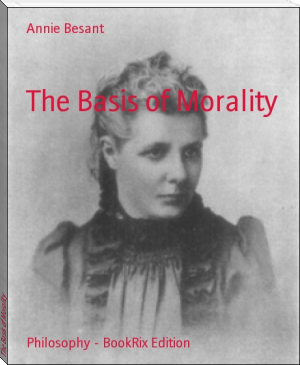author - "Annie Besant"

e, and will do better next time. The trouble, the pain, we havebrought on ourselves by our ignorance, we note, as showing that we havedisregarded a law, and we profit by the additional knowledge in thefuture.
Thus understanding conscience, we shall not take it as a basis ofmorality, but as our best available individual light. We shall judgeour conscience, educate it, evolve it by mental effort, by carefulobservation. As we learn more, our conscience will develop; as we actup to the highest we can see, our vision will become ever clearer, andour ear more sensitive. As muscles develop by exercise, so consciencedevelops by activity, and as we use our lamp it burns the more brightly.But let it ever be remembered that it is a man's own experience thatmust guide him, and his own conscience that must decide. To overrule theconscience of another is to induce in him moral paralysis, and to seekto dominate the will of another is a crime.
* * * * *
IIIUTILITY

closely resemble that of a refined product of a coarse idea, and the only method of deciding between degeneration and evolution would be the examination, if possible, of intermediate and remote ancestors. The evidence brought forward by believers in the Wisdom is of this kind. They allege: that the Founders of religions, judged by the records of their teachings, were far above the level of average humanity; that the Scriptures of religions contain moral precepts, sublime ideals, poetical aspirations, profound philosophical statements, which are not even approached in beauty and elevation by later writings in the same religions--that is, that the old is higher than the new, instead of the new being higher than the old; that no case can be shown of the refining and improving process alleged to be the source of current religions, whereas many cases of degeneracy from pure teachings can be adduced; that even among savages, if their religions be carefully studied, many traces of lofty ideas can be found, ideas whi

imself familiar with it. If he were studying only the body, and desired to understand its activities, he would have to classify its tissues at far greater length and with far more minuteness than I am using here. He would have to learn the differences between muscular, nervous, glandular, bony, cartilaginous, epithelial, connective, tissues, and all their varieties; and if he rebelled, in his ignorance, against such an elaborate division, it would be explained to him that only by such an analysis of the different components of the body can the varied and complicated phenomena of life-activity be understood. One kind of tissue is wanted for support, another for movement, another for secretion, another for absorption, and so on; and if each kind does not have its own distinctive name, dire confusion and misunderstanding must result, and physical functions remain unintelligible. In the long run time is gained, as well as clearness, by learning a few necessary technical terms, and as clearness is above all things

ich you require, you can evade those you do not require, you can utilize those you need, and thus you can bring about the result that nature, without that application of human intelligence, cannot so swiftly effect.
Take it, then, that Yoga is within your reach, with your powers, and that even some of the lower practices of Yoga, some of the simpler applications of the laws of the unfolding of consciousness to yourself, will benefit you in this world as well as in all others. For you are really merely quickening your growth, your unfolding, taking advantage of the powers nature puts within your hands, and deliberately eliminating the conditions which would not help you in your work, but rather hinder your march forward. If you see it in that light, it seems to me that Yoga will be to you a far more real, practical thing, than it is when you merely read some fragments about it taken from Sanskrit books, and often mistranslated into English, and you will begin to feel that to be a yogi is not necessarily

e, and will do better next time. The trouble, the pain, we havebrought on ourselves by our ignorance, we note, as showing that we havedisregarded a law, and we profit by the additional knowledge in thefuture.
Thus understanding conscience, we shall not take it as a basis ofmorality, but as our best available individual light. We shall judgeour conscience, educate it, evolve it by mental effort, by carefulobservation. As we learn more, our conscience will develop; as we actup to the highest we can see, our vision will become ever clearer, andour ear more sensitive. As muscles develop by exercise, so consciencedevelops by activity, and as we use our lamp it burns the more brightly.But let it ever be remembered that it is a man's own experience thatmust guide him, and his own conscience that must decide. To overrule theconscience of another is to induce in him moral paralysis, and to seekto dominate the will of another is a crime.
* * * * *
IIIUTILITY

closely resemble that of a refined product of a coarse idea, and the only method of deciding between degeneration and evolution would be the examination, if possible, of intermediate and remote ancestors. The evidence brought forward by believers in the Wisdom is of this kind. They allege: that the Founders of religions, judged by the records of their teachings, were far above the level of average humanity; that the Scriptures of religions contain moral precepts, sublime ideals, poetical aspirations, profound philosophical statements, which are not even approached in beauty and elevation by later writings in the same religions--that is, that the old is higher than the new, instead of the new being higher than the old; that no case can be shown of the refining and improving process alleged to be the source of current religions, whereas many cases of degeneracy from pure teachings can be adduced; that even among savages, if their religions be carefully studied, many traces of lofty ideas can be found, ideas whi

imself familiar with it. If he were studying only the body, and desired to understand its activities, he would have to classify its tissues at far greater length and with far more minuteness than I am using here. He would have to learn the differences between muscular, nervous, glandular, bony, cartilaginous, epithelial, connective, tissues, and all their varieties; and if he rebelled, in his ignorance, against such an elaborate division, it would be explained to him that only by such an analysis of the different components of the body can the varied and complicated phenomena of life-activity be understood. One kind of tissue is wanted for support, another for movement, another for secretion, another for absorption, and so on; and if each kind does not have its own distinctive name, dire confusion and misunderstanding must result, and physical functions remain unintelligible. In the long run time is gained, as well as clearness, by learning a few necessary technical terms, and as clearness is above all things

ich you require, you can evade those you do not require, you can utilize those you need, and thus you can bring about the result that nature, without that application of human intelligence, cannot so swiftly effect.
Take it, then, that Yoga is within your reach, with your powers, and that even some of the lower practices of Yoga, some of the simpler applications of the laws of the unfolding of consciousness to yourself, will benefit you in this world as well as in all others. For you are really merely quickening your growth, your unfolding, taking advantage of the powers nature puts within your hands, and deliberately eliminating the conditions which would not help you in your work, but rather hinder your march forward. If you see it in that light, it seems to me that Yoga will be to you a far more real, practical thing, than it is when you merely read some fragments about it taken from Sanskrit books, and often mistranslated into English, and you will begin to feel that to be a yogi is not necessarily




